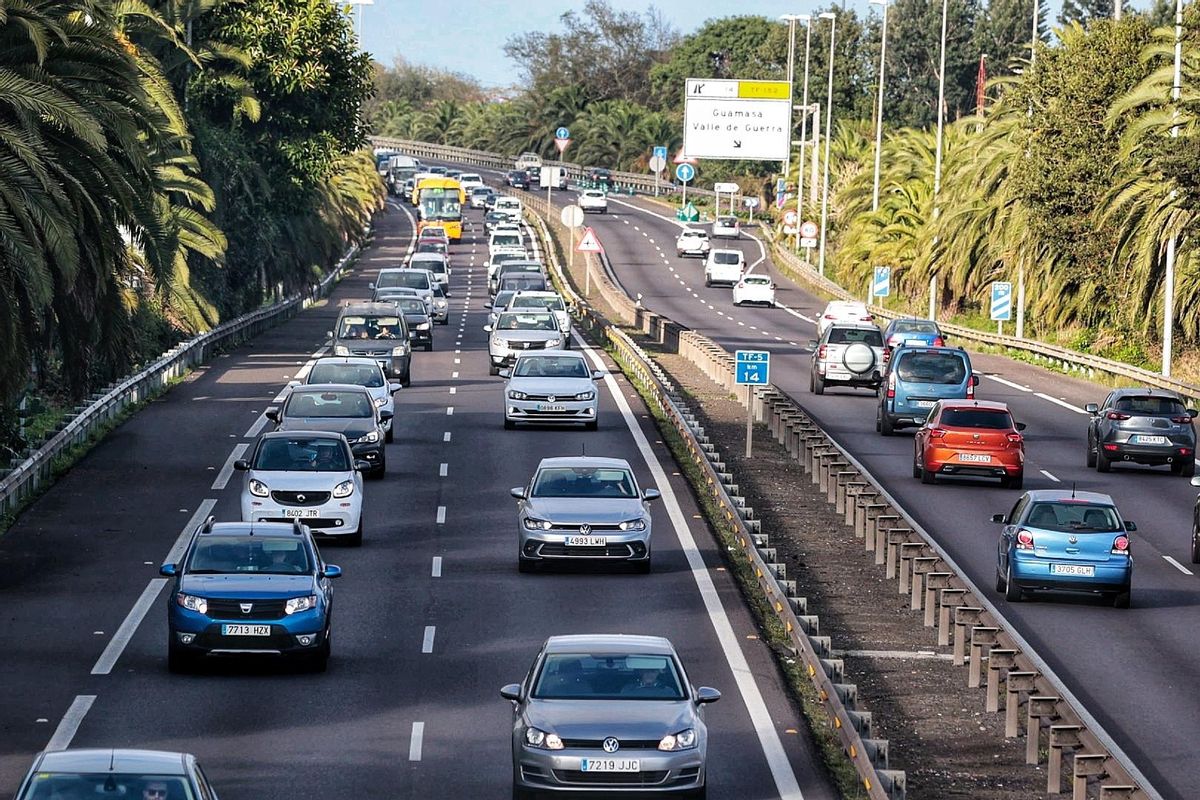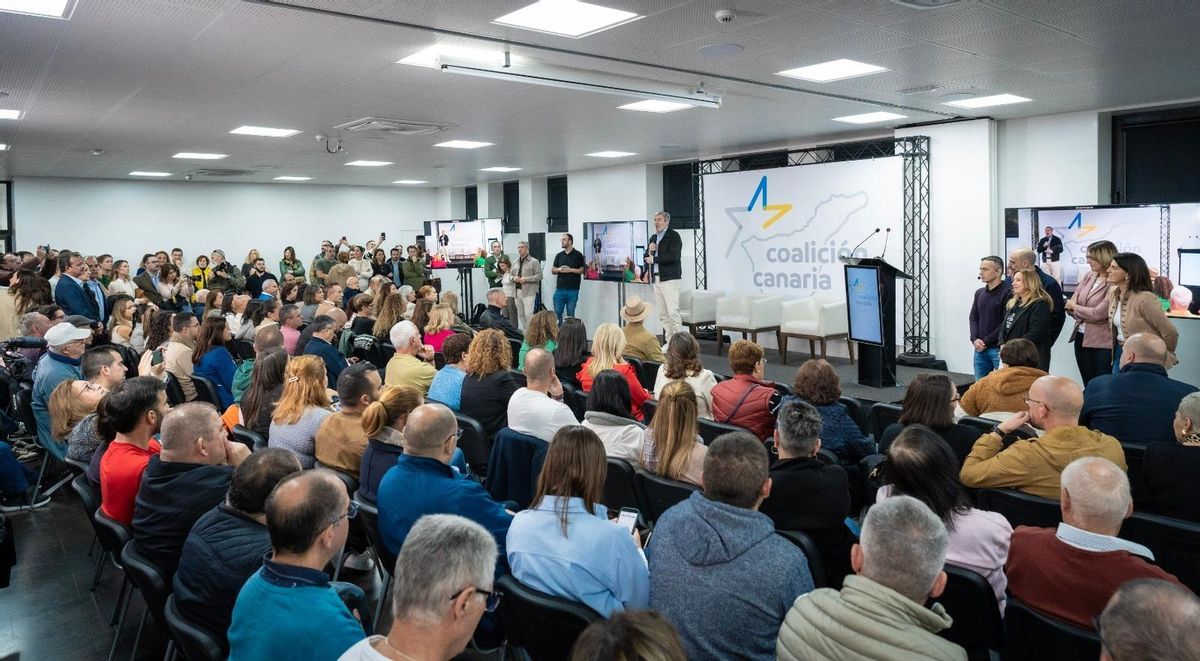The Canarian coalition of Tenerife suggests harnessing Artificial Intelligence to alleviate congestion on one of the busiest routes on the island, the North Highway, and to implement a residency law to curb population growth. These are two of the primary initiatives proposed by the Nationalist Party on Saturday, which are included in the Measures package aimed at addressing critical issues concerning the future of Tenerife, focusing on mobility, demographic challenges, and health.
These proposals emerged from a convention conducted on Saturday at the Hotel School of Santa Cruz de Tenerife, attended by over 300 individuals, consisting of public figures, representatives from all the island’s committees, affiliates, and supporters.
Among the ideas presented at the three dedicated discussion tables for the event is the use of artificial intelligence to enhance traffic management on TF-5. During the mobility roundtable, the priority objectives included the deployment of these Intelligent systems to manage traffic congestion on the North Highway, along with the expansion of lane capacity on the southern highway (TF-1), transitioning to three lanes from San Isidro to Adeje, and the establishment of a third lane on the TF-5 (Los Rodeos-La Orotava Airport).
Regarding the application of artificial intelligence to improve traffic management on the North Highway, Dámaso Arteaga, the Minister of Roads for the Cabildo de Tenerife, clarified that “our proposal entails introducing Access control systems on the TF-5 highway backed by intelligent transport systems (STIs) that can inform drivers, enhance safety, and coordinate a more efficient transport network, managing demand, improving traffic flow, and increasing road safety.”

Queues on the North Highway of Tenerife. / María Pisaca
Demographic Challenge
In the demographic challenge discussion table, which was another significant topic at the meeting, it was suggested to introduce tax reductions for residents in municipalities with lower populations. Alfonso Cabello, spokesperson for the Canary Islands government, explained, “In Tenerife, we have municipalities that have experienced population decline in recent years, and we need to reverse that trend.”
“Therefore, as a nationalist project, we are committed to implementing a series of tax cuts for residents in areas with fewer inhabitants, preserving the identity of these regions while creating new opportunities and decentralising services to attract population back to those areas,” he stated.
According to José Manuel Bermúdez, the mayor of Santa Cruz de Tenerife, “It is unsustainable for the population of the Canary Islands to have grown by 431,000 in the last 20 years. It is urgent that public policies are harmonised among various administrations to ensure a holistic approach catering to the specific needs of Tenerife and the Canary Islands.” Therefore, he advocated for A residency law to control incoming residents.
Clari Pérez, the first deputy mayor of Arona, remarked that population growth in the Canary Islands has reached “unsustainable levels.” “In 1996, the southern region of Tenerife had about 110,000 inhabitants. Today, we are nearing almost 300,000 inhabitants, representing an increase of over 160% in under 30 years.”
Faced with these statistics, “We cannot continue to disregard this reality: The land is finite, as are the resources,” Pérez stated. “We must pursue viable solutions to tackle this challenge, and one potential measure could be the enactment of a residency law to regulate the influx of newcomers, ensuring a balance between development and sustainability, while safeguarding the right to housing for the citizens of the Canary Islands,” she added.

Fernando Clavijo addressing attendees at the Canarian Coalition Convention of Tenerife. / Ed
Public Transport
Throughout the discussion, the significance of free public transport in Tenerife was emphasised, identified as a “right achieved by the Canarian coalition,” according to its leaders, who provided supporting data. They noted that since the introduction of free transport, “we have prevented 33 million car journeys.” The expectation for 2024 is that there will be 12 million fewer trips by private vehicles, facilitated instead by buses, “thanks to our policies,” Arteaga asserted. He also reiterated that the need for free transport “is not a temporary fix, but a structural measure anchored in national legislation.”
Francisco Linares, secretary general of CC of Tenerife and Mayor of La Orotava, remarked, “We have had the opportunity not only to examine the work being carried out at both local and insular levels but also to create a platform for planning, proposing, and sharing policies to address the challenges of this land that concern us and affect the daily lives of the people of Tenerife, such as mobility, health, and demographic challenges.”
National Secretary of the Canarian Coalition and President of the Canary Islands Government, Fernando Clavijo, underscored that the topics discussed are “crucial for the future of Tenerife and the Canary Islands,” including demographic issues, health, and mobility. “We must clarify our stance with local governments and town halls, as they are the closest institutions and the first line of response to everything happening in our territory.”
The Secretary of Organisation of CC of Tenerife and President of the Cabildo, Rosa Dávila, stated, “This convention has provided us an opportunity to amplify local management voices and showcase their role, not just in enhancing the daily lives of citizens but also in managing the significant challenges facing this land.”

Castillo de Santa Cruz Street in Tenerife bustling with people. / María Pisaca
Ana Dorta, Mayor of Guía de Isora and also a speaker at the Mobility Bureau, affirmed that CC “will continue to advocate for the southern region of Tenerife, striving for collective and more sustainable mobility.” “Consequently, new routes and connections have been established in various municipalities; the University Shuttle Gua has been initiated from Adeje to the Guajara campus, alongside transport on demand in the regions of Arico, Fasnia, and Güímar; we are forming specific agreements with the taxi sector in Guía de Isora, and importantly, the South Train project has been revived after being dormant under the previous PSOE administration,” she mentioned.
Health
During the Health Discussion, Rosa Dávila (President of the Cabildo de Tenerife) emphasised the Cabildo de Tenerife’s role in health matters, collaborating with the Canary Islands government to invest in improvements to Tenerife’s hospitals, thereby reducing the need for patient transfers. She cited initiatives conducted in the Northern Hospital, such as the afternoon opening of operating theatres and, in the case of the Southern Hospital, the establishment of the Palliative Care Unit that serves over 1,000 patients annually, as well as oncology day services.
For his part, Carlos Gustavo Díaz, Director of the Canarian Health Service Magec, spoke about the transition to a unique Canary Historic. He also highlighted the advancements achieved in both the Northern and Southern hospitals, including the introduction of the new Oncological Day Hospital and the first palliative care unit at the Southern Tenerife Hospital, as well as the launch of home hospitalisation in the Northern Hospital.
The Insular Canarian Coalition Convention in Tenerife also functioned as the second meeting of the Canarian coalition with its grassroots ahead of the VIII National Congress scheduled for April 5 and 6 in Gran Canaria, thereby fulfilling one of the nationalists’ objectives to invite debate and participation among the ranks.
In this regard, Fernando Clavijo recalled the origin of “A force that emerged from Canarian society, born from grassroots movements, as it was born from a society’s concern to fight for their rights in Madrid.” Thus, Clavijo called for a “united nationalism that strengthens through the engagement we have in April, to continue fighting even more vigorously for the rights of this land before the State.”















